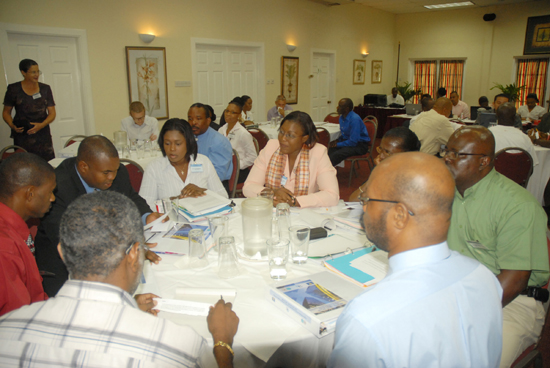 CASTRIES Saint Lucia - Supply and reduction strategies are key to a successful implementation of the national anti-drug plans, a fact which was recognized by participants at the four-day Regional Workshop for the Development of Anti-Drug Strategies and Plans in Saint Lucia.
CASTRIES Saint Lucia - Supply and reduction strategies are key to a successful implementation of the national anti-drug plans, a fact which was recognized by participants at the four-day Regional Workshop for the Development of Anti-Drug Strategies and Plans in Saint Lucia.
Throughout the deliberations, one issue kept coming to the fore; the support from and to the political directorate. As one participant stated, the political directorate are the policy-makers and have to have the near perfect balance in budgetary allocations.
In looking at the situation faced by the Caribbean's political leaders, John Carnevale stated, "The drug issue permeates many issues in society that they are dealing with; problems with employment, housing, and health. These are three areas they would have to think about, but they have to remember that drugs are problems in all those areas."
He recognized that the politicians are the ones who have to sell their political value to the electorate, yet at the same time formulate policies aimed at reducing the drug menace, yet maintain an acceptable level of positive economic activity.
This is a near impossible balance in the Caribbean he says since the societies are so inter-mingled and persons so inter-dependent on each other.
"The drug problem is not just about the drug problem but of the other problems it creates in other aspects of the economy and of the society," Carnevale added. "My advice is not forget about the drug issue as you formulate policy to move forward."
Politicians get their jobs by running for office by interviewing the entire society to get their jobs, and must explain their actions, decisions, and policies to the voters.
"Political issues that are news worthy are the ones they will talk about the most," observed Carnevale. "The more news worthy issues that they are dealing with such as social and economic problems are very much affected by the drug issue and they can do a lot to address those problems by dealing with the drug issue. "
He further pointed out that perhaps they will not talk so much about the drug issue but of the benefits of addressing that issue in solving other problems that are news worthy.
The workshop's participants concur with his opinion, and think that the time for the critical decision-making are long upon the region, and that the Caribbean's leadership must quickly move towards collective decision taking on the drug use and abuse issues.
One of the participants said that while the national anti-drug plans are of critical importance, in her opinion, "there needs to be the immediate formulation of a regional anti-drug plan which would further strengthen the programmes and policies of the individual countries."